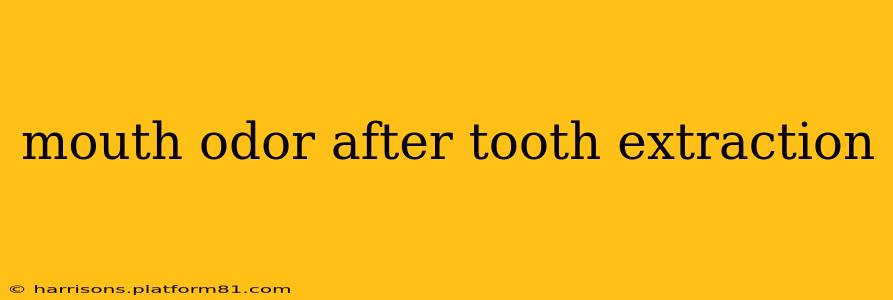Experiencing bad breath after a tooth extraction is a common concern. While often temporary, understanding the causes, prevention strategies, and treatment options can significantly alleviate discomfort and promote faster healing. This comprehensive guide addresses the issue of post-extraction halitosis, providing you with valuable insights and practical advice.
Why Does My Breath Smell Bad After a Tooth Extraction?
Several factors contribute to bad breath following a tooth extraction. The most prominent causes are:
-
Blood and Tissue Debris: The extraction site naturally produces blood clots and tissue debris as part of the healing process. These can decompose, leading to an unpleasant odor. This is usually the most significant contributor in the immediate post-extraction period.
-
Infection: An infection at the extraction site is a serious complication and can cause a noticeably foul smell. Signs of infection include increased pain, swelling, redness, and pus. Seek immediate medical attention if you suspect an infection.
-
Dry Socket: Also known as alveolar osteitis, this is a painful condition where the blood clot at the extraction site dislodges, exposing the underlying bone. Dry socket is a significant cause of bad breath due to the bone's exposure to air and bacteria.
-
Poor Oral Hygiene: Neglecting oral hygiene after a tooth extraction can exacerbate bad breath. Food particles trapped near the extraction site can decay and contribute to odor.
-
Medications: Some medications can have side effects that include dry mouth (xerostomia). Dry mouth reduces saliva production, which is crucial for neutralizing acids and bacteria that cause bad breath.
How Can I Prevent Bad Breath After a Tooth Extraction?
Proactive measures are key to minimizing the risk of post-extraction halitosis:
-
Follow Post-Operative Instructions: Strictly adhere to your dentist's instructions regarding post-operative care. This includes proper rinsing techniques and medication adherence.
-
Gentle Rinsing: Rinse your mouth gently with saltwater (1/4 teaspoon salt dissolved in 8 ounces of warm water) several times a day. Avoid forceful rinsing or spitting, as this could dislodge the blood clot.
-
Maintain Good Oral Hygiene: Brush your teeth gently, avoiding the extraction site, and floss carefully, skipping the area around the extraction.
-
Avoid Smoking: Smoking significantly impairs healing and increases the risk of infection and dry socket, both contributors to bad breath.
-
Stay Hydrated: Drinking plenty of water helps stimulate saliva production, keeping your mouth moist and fighting bacteria.
-
Healthy Diet: Consume a balanced diet, avoiding foods that can exacerbate bad breath, like garlic and onions.
What If I Still Have Bad Breath After a Tooth Extraction?
If bad breath persists despite following these preventative measures, it's crucial to consult your dentist. They can assess the situation and determine if:
-
Further cleaning is needed: A professional cleaning might be required to remove any lingering debris.
-
An infection is present: Antibiotics may be prescribed to address an infection.
-
Dry socket has developed: Treatment for dry socket often involves packing the socket with medicated dressings to promote healing.
How Long Does Bad Breath After Tooth Extraction Last?
The duration of bad breath after a tooth extraction varies depending on the individual and the healing process. Generally, it should subside within a few days to a week as the extraction site heals. Persistent bad breath beyond this timeframe warrants a dental visit.
Can I Use Mouthwash After a Tooth Extraction?
Using mouthwash after a tooth extraction can be helpful, but it's important to follow your dentist's recommendations. Avoid alcohol-based mouthwashes as they can irritate the extraction site. A saltwater rinse is generally preferred in the initial days following the procedure.
Does Bad Breath After a Tooth Extraction Mean Something is Wrong?
While bad breath is a common occurrence, it doesn't automatically signify a problem. However, persistent or worsening bad breath, accompanied by other symptoms like pain, swelling, or pus, indicates a potential complication and requires immediate dental attention.
This information is for general knowledge and does not constitute medical advice. Always consult your dentist or oral surgeon for diagnosis and treatment of any oral health concerns.
